
Features | Lists
By The Staff
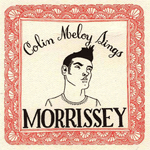
Colin Meloy
Sings Morrissey EP
(Self-released)
This EP wasn’t supposed to be important. Colin Meloy sat down for about twenty minutes one day (and however long it took him to do the overdubs), recorded a few b-sides by his idol, and had a few copies made so as to have something fun to sell on his solo tour. If anything, though, Sings Morrissey is almost more essential than Picaresque. As great as the Decemberists’ latest album is, it fits a little too comfortably with the rest of the band’s oeuvre to be considered a truly essential release. On the other hand, how often do we get to hear our favorite artists pay serious tribute to their influences? Meloy’s simple acoustic covers reveal the lyrical parallels between himself and the former Smiths frontman, with Meloy trading pirates for poets and Jack the Ripper. Morrissey may not reference Charles Dickens and the like directly, but he understood the same feelings of loneliness and dissatisfaction with society that play into many of Meloy’s disgruntled protagonists. These renditions are dutiful enough for Smiths aficionados to have nothing to complain about, but for Decemberists fans, it’s refreshing to hear to our intrepid hero playing something so different and meaningful.
David Greenwald

Super Furry Animals
Mwng Reissue
(XL; 2000/2005)
Super Furry Animals always drew their strength from their singular quirkiness, but on 2000’s Mwng, that quirkiness went to a whole new stratosphere. Sung entirely in their native Welsh, the album is indecipherable to the majority of its audience (which in the U.K. at least, had become pretty substantial by that point), but it may actually be the most musically accessible album they’ve released. Tracks like “Ysbeidiau Heulog” and “Ymaelodi A’r Ymylon” are pretty straightforward and amazingly catchy, but they’re balanced by groovier, more brooding tracks like “Pan Ddaw’r Wawr,” which toy with texture and structure with the kind of playfulness that has defined the SFA catalogue. While it may lack the jaw-dropping wacko-pop mastery of its predecessor Guerrilla, Mwng holds together better than just about any of their albums, and is one of those very rare foreign language albums that you can’t help finding yourself singing along to.
Matt Stephens
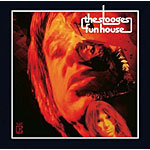
The Stooges
Fun House Reissue
(Elektra/WEA; 1970/2005)
It’s a true stereotype that Major League Baseball players have the lamest taste in popular music imaginable. Nowhere is this more evident than in the visiting half of the ninth inning, where every closer in the league exits the bullpen to the oh-so original strains of “Welcome To the Jungle” or “Enter Sandman.” Scary. Pro baseball has yet to acquire its own Steve Nash; a free spirit who’ll sing the praises of Radiohead in the pages of GQ and take the mound to “Down On The Street”; Iggy Pop’s inhuman screams terrifying the living crap out of both the opposition and unwitting baseball fans alike.
“Chunka, chunka, chunka, CHA-CHUNK, a-chunka, chunka, chunk OH!!!”
Fuck yeah. It’s been ten years since I heard Fun House for the first time and its initial four seconds still fill me with the urge to hurl cinderblocks through storefront windows. “Down On The Street” and “Loose” are simply the shining archetype of how any and every rock album should begin; by rocking the listener into submission with the first track and then unexpectedly upping the energy level to sadistic extremes with the second. Tracks three and four are no less monumental. Rage Against the Machine’s “Sleep Now In the Fire” is a complete rip of “TV Eye” (best false ending ever!) and the Jungle Brothers so liked the way that Iggy Pop smacked his lips in “Dirt” that they looped an entire song around it.
The Rhino remaster of Fun House comes loaded with the requisite goodies; better sound, Jack White penned liner notes, and a second disc filled with outtakes. But its purpose is best served as a simple reminder that the “Greatest American Rock Record of All Time” exists at all. It’s been thirty-five years since its initial release, and Fun House is still incapable of being topped. Disciples whose original copies are scratched to the point of uselessness will have fun sorting through the inessential outtakes here, most of which are a testament to the fact that Iggy Pop had several versions of the lyrics to “Loose” in the can, and “Down On The Street” was demoed at different speeds until the band got it right. As for the non-Fun House cuts, “Lost In the Future” is a lame in-joke, and “Slidin’ The Blues” works okay as a showcase for honorary fifth Stooge Steve MacKay’s saxophone, but its inclusion on the album proper would have been unnecessary. Producer Don Galluci got it right the first time.
My CMG colleague Clayton Purdom phrased it quite nicely: “If you don’t already own this….don’t let us know.”
David M. Goldstein

Wolf Parade
Wolf Parade (aka 4 Songs) EP
(Self-released)
There’s been some talk about these guys; perhaps you heard it. Much of it centered on their Venn overlaps with 2004’s Montrealian AOTY supergroup Arcade Fire, manic detractors crying “Hype!” and wild-eyed maven crying “Truth!” whilst the gleefully ignorant masses scratch their heads, all, “WTF?” at the indie rock namecalling. If you’ve been reading CMG, you know which side of the debate we fall—album of the year! we say, and no writer can vouch greater enthusiasm than myself, who stumbled around for about six months functioning solely as a one-man hype machine, rabblerousing Apologies to the Queen Mary to anyone within earshot. In the wake of that release, the chatter only increased, but it expanded to include the contentious assertion that Isaac Brock’s production had ruined Wolf Parade before they even got started.
I’ll not give this argument any merit—Apologies is a front-to-back triumph, and the production works fine—but, to be sure, Four Songs presents some solid proof that maybe Brock fucked things up a bit. Opener “Dinner Bells” is a clear-cut superior to its major-label counterpart, four minutes of lost-soul wailing before the song lurches to a halt, and over sonic pings and guttural guitar grumbles a harmonica wheezes, a lone cry from atop a mountain of ashes. This harmonica chills me to the marrow, and it resounds with death. Many would side with Brock’s version of “Modern World,” but I’ll take this rendition: check the way Krug’s vocals coalesce with the blustery synths and slabs of guitar to form a thick sheet of rugged sound, a wash of hurt noise, indeterminate musings on indeterminate times. Better still is the diabolical slither of “Secret Knives,” which busts open like a jack-o-lantern from the balcony, a gut-busting howl that finds its denouement in the clatter and thrust of “Wits or a Dagger,” parts of which could kill a small animal if played loud enough. Never mind the funny sequencing—start with the epic, end with the weird track?—Four Songs is more than an embryonic classic, more than a precursor of Apologies’ admitted enormity. Its merits are well-earned, and if Brock maybe mishandled these raw materials a bit, well, one listen to the cold la-la-laing that closes this EP suggests that Wolf Parade may be doing a little too much too quickly for anyone to know what to do with. Someone give Steve Albini a call, see what he can do with all this fury.
Clayton Purdom
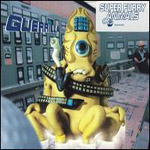
Super Furry Animals
Guerilla Reissue
(XL; 1999/2005)
2005 taught me one thing, and one thing only, and that’s that the Super Furry Animals are the fucking awesomest.
Seriously. And Guerilla reminded me that albums were still being crafted post-OK Computer, no matter what any umbrella-wielding critic may say, and that the impeccable feracity of a band shamelessly flaunting pop could surpass the limiting tint of pop; the Super Furry Animals were making singular, original music, epic while still bent on melody. Of course, they were doing this with Fuzzy Logic (1996) and Radiator (1997) packs the same wallop as this here album, but Guerilla marked the first time SFA created a full, cohesive statement instead of a list of dripping singles.
Just consider—how deeply you concentrate is your own deal—the sylvan euphony of “The Turning Tide” flaking into the pool of “Northern Lites,” whose calypso horns orient the listener inside the coconut liquid of an island drink. The steel drums then breaking into “Night Vision’s” scary bassage are startling at first, until “Vision’s” queer, pulsing interlude and coda preview “Wherever I Lay My Phone’s” nautical intro. “Phone,” a spastic anthem conjured out of nothing, hearkens back to “Northern Lites’s” communal dance, wrapping the four songs in on themselves. Yep, that’s just for four songs.
Once Guerilla’s unwound, looped through the massive heartbreak of “Some Things Come From Nothing” and “The Door To This House Remains Open,” dribbled into a curly-que in the last seconds of a hidden chant/drum roll, Guerilla’s only half over. The rest is putting the monster back together, which is why a reissue was inevitable. Or because Creation went under. I dunno.
Dom Sinacola
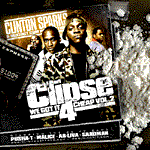
Clipse
We Got It For Cheap, Vol. 2 Mixtape
(mixunit.com)
Dear Santa,
There are four rappers that I know have been really really bad over the past little while, but I think they still deserve Christmas gifts and to get into heaven because they are really good rappers, and sometimes to bring happiness and joy to millions of rap kids at Christmas you have to do some bad things so that you have some interesting things to rap about, or as mom says something for kids to listen to so they can irritate their moms and dads. I am talking about the Clipse.
I know that sometimes some rappers rap about selling drugs and basically just how it is really cool to sell drugs (they are wrong, it is bad) or at least they make it sound cool, but they don’t make it sound cool by sounding cool when they rap, they just say things like they are tough like bullies but really they are just stupid and can’t think of anything else to rap about besides selling drugs so they just rap about that and just swear a lot and talk about kissing their girlfriends after. It’s ok sometimes but if I listened to everything they said and did things like that mom says I would be in jail and have no wife when I get older to take care of me and have dangerous diseases that make peeing hurt like the ones they talk about in school.
And Santa I think that Clipse talk about stuff like that, too, but they do it really smartly – more smart than most rappers I think. I have not been listening to rap for too long but these guys rhyme more sounds in their raps than most rappers seem to do, but they don’t do it by saying a lot of words really quickly, they just seem to talk but rhyme it and make it sound good and even clever when I actually understand what they are talking about (I don’t understand all the slang words for drugs like “ostrich” – that’s a bird, not drugs as far as I’m concerned) but even when they do battle rapping they make it sound like they sold you drugs and that’s why you are wack like in this line “on the rise n!gga / right before your eyes / you ain’t even see it coming / did ya? / you was probly high.” So really what they are saying is “be good at what you do and you will be successful” which is actually the American Dream or so my history teacher says. But they also say things that sound like good family stories, too, like when Pusha talks about how he wanted to ask his friend Thurman how he could kiss the girl that Pusha liked because Thurman was a friend but he died: “that was my man / woulda gave a n!gga grams / wanted to ask why but I never had the chance / I never got an answer / Thurman he got a cancer / I looked up at the heavens and tell him / you still my man, cuz.” It is like they are real people that have had things happen to them that have happened to people you know (like my brother who always says his girlfriend has kissed way lots of guys on our block). And are not just rap stars.
And finally I know that they took the best beats from the most popular rap songs over the past two or three years and did not really get many of their own beats for this album but I do not think it is stealing because they make all the old songs sound better than the actual people who did them so if they make the songs better it should be ok, I think. From listening to a rapper called Cadence Weapon I have learned what cadence is and I think that these guys have a lot of it in their songs, so their songs are better than most rappers.
So Santa please forgive the Clipse and their friends the re-up gang for all of their drug deals because they are really good rappers and are more clever and inventive than most of the other rappers I have heard all year especially all of the other drug rappers and please let them into heaven when they die and give them gifts (I think they do not have a record contract so you should look into that).
Love,
Aaron Newell
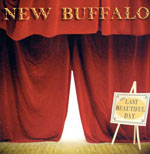
New Buffalo
Last Beautiful Day
(Dot Dash/Arts & Crafts; 2004/2005)
America is running out of buffalo. According to Wikipedia, there are only a few thousand pure American Bison left thanks to inbreeding with cattle. So, Sally Seltmann’s nom de plume isn’t so ridiculous after all. Seltmann and her re-released debut album are rare beasts themselves, and as easy as it would be to pigeonhole them into their respective singer/songwriter genre limitations and Postal Service (uh…) references, The Last Beautiful Day is too intriguingly inventive to discard so simply.
Eschewing the vocal acrobatics of Feist and Beth Orton (who makes a too-brief guest appearance on “It’ll Be Alright”), Seltmann the singer focuses on the melody rather than melismatics. Thankfully, Seltman the songwriter has created worthy compositions, and if the album was just her cool (in the jazz sense), playful vocals pouring over a lone acoustic guitar, this would still be great. What does make it ridiculous after all is the inspired production of her husband, Darren Seltmann of the Avalanches. While certain songs are unadorned (“Yes” and “Come Back,” the token acoustic ballad), he gushes swirling samples all over “No Party” and the feisty “While You’re Away.” “Give me some time, it’s all that I need,” she sings on “While You’re Away,” but be careful: if you give New Buffalo even a minute, she’ll steal your heart.
David Greenwald
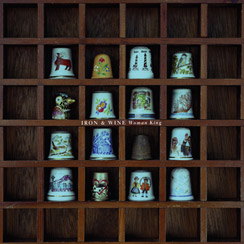
Iron and Wine
Woman King EP
(Sub Pop)
Good Mother of Mercy do I love Brian Deck. I love that he graduated from Northwestern with a degree in percussion, that he’s in Califone, that he’s not as douchey as Steve Albini.
I’ll admit this odd twitterpation like a bullfrog mates: headfirst and covered in algae. It works, then, when the percussive flourishes holding Woman King apart from its neo-folk and basement pop brethren never seem intrusive. Just swampy and a bit sinister. This EP, the supposed “new sound” for Sam Beam, ends up a skipped stone more “progressive” than Our Endless Numbered Days (2004), another Deck wonder, but rarely leaves the base set down by that preceding studio album. Never smooth, but never really complicated, King has Beam shaking off the romance of the bedroom for bark shoes…which is what he did last year but only now he’s more willing to indulge the subliminal tendencies in his music—the virgin and the whore and the Grey in between? Somewhere behind, assured of the songwriter’s path, Deck screams when he has to, otherwise reminding the band to not stray too far from home.
This kind of atomic love (between myself and all-star producer, not between frogs) is too primal to be analyzed; the reasons for its existence are many, but the instinct at its nucleus is vague and unspeakable. Maybe I’ll never grow tired of Deck’s glass and garbage drums (see: Califone‘s Roomsound; Red Red Meat), or maybe I’ll become too aware of how effortlessly he hides the cliché of outdated electronic colors (check: Modest Mouse’s Moon and Antarctica; Ugly Casanova) inside harrowing audience participation. Or maybe I’ll trust my gut (see: Holopaw).
Besides dabbling in some striking, riff-bloated guitars and more fevered beats, Beam’s music still maintains a quiet, lamenting awe. “Jezebel” can open your chest and “Lillith’s Song” can pray for your split skin; but so could “Cinder and Smoke,” and so could “Southern Anthem.” It is strange, then, when on tour with Calexico, Beam transformed “Jezebel” into castigating funk, taking the “dah dah dah’s” in the chorus literally. It sounds strange because Woman King seems frighteningly similar to Creek Drank the Cradle (2002), even though we all know that, goddamnit, now Iron and Wine uses drums! I thank Brian Deck for such a peaceful transition.
Dom Sinacola
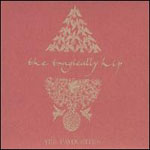
The Tragically Hip
Yer Favorites Comp
(Capitol)
Like most pop music fans in Canada (and the Great Buffalo area, supposedly), I’ve always liked the Tragically Hip. But there’s never been a Hip record that I’ve loved, despite years of trying; albums like Up To Here, Phantom Power, and Fully Completely are all solid, but I always just ended up gravitating towards my four or five favourite tracks on each, continually neglecting the rest. Thus, I had for a long time sought after a decent best-of package that would compile all of, um, my favourites, and perhaps introduce me to a few forgotten nuggets along the way.
Yer Favourites is everything I’d been hoping for, and about 75 minutes more. Taking 35 of the band’s most-loved tracks (chosen by fans via an online poll) and two obligatory newbies, the set should satisfy and educate any fair-weathers like myself. You’ll of course find “Fifty-Mission Cap,” “Poets,” “38 Years Old,” and god knows how many other Can-con classics that (if you’re a Canuck at least) you just automatically know the words to, but you’re bound to also stumble across just as many that you slept on the first time around (for me: “Cordelia,” “Escape is at Hand For the Travelin’ Man,” to name just a couple). Yer Favourites is as expansive and well-sequenced as any Hip fan could hope for, and would serve as a great (and unbelievably well-priced) introduction to any unconverted Yank wondering what all the fuss is about.
Matt Stephens
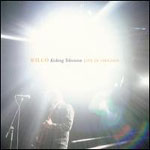
Wilco
Kicking Television
(Nonesuch)
There are two types of good live albums. The first is the “live-album-as-definitive-statement” live album, the recording of a band at its most primal and pure, a sonic testament of the validity of the band’s (supposed) greatness. If, for example, you were gonna buy an MC5 album, it’d probably be Kick out the Jams, because everyone agrees it best captures the band’s dirty ruckus; similarly, Led Zeppelin’s monstrous How the West Was Won, because of its production values, song selection and ferocity, is probably their most essential recording. The second category of good live album is the “live-album-as-alternative-statement” live album, which purports to expand upon the band’s repertoire, to showcase a previously unheard facet of the artistic device. Radiohead’s I Might Be Wrong brought the Kid A/mnesiac austerity to glistening aural life, Lauryn Hill’s Unplugged album was a failed attempt to strip away the hype and exhibit the songwriter beneath (too much crying, etc.), and Jimi Hendrix’s Band of Gypsies exhibited a jazzy, free-roving mystic at his spaciest. These albums work as unkempt paths off the main road, of interest mainly to fans and sympathetic critics.
I delineate these two categories to explain why Wilco’s live album is so significant. Like Nirvana’s Unplugged, Johnny Cash’s At Folsom Prison, and Sam Cooke’s Live at the Harlem Square Club before it, Wilco’s Kicking Television functions on both planes, simultaneously a rousing reanimation of the band’s catalogue and a stirring new statement from a verifiably great band at its most restless.
Just like Cooke’s live album shot sweat and sex out of the artist’s pop canon, simultaneously expanding and invigorating what the entity “Sam Cooke” meant to humanity, Kicking Television injects violence and kinetics throughout Wilco’s last two albums, defying the accusations of “aloofness” (which is a word, I think) and “inaccessibility” so often leveled at the band. Can Wilco translate P.J. O’Rourke’s transcendent twiddling to the live setting? Yes, replies one listen of “I Am Trying to Break Your Heart,” which captures every off-kilter ring and pregnant hum of the album version with newfound vitality and humanity (i.e., a definitive statement). Contrarily, “Jesus, Etc.” scraps the album’s withdrawn string arrangement for hopeful slide guitars, cooing Korg stringz and adorable organ chirrups (thereby, an alternate statement of a classic song).
The production throughout is fantastic: lean and solid (especially Glenn Kotche’s drums) but careful to maintain the loose charisma of the band and convivial enthusiasm of the hometown crowd. It captures the ramshackle charm of “I’m the Man Who Loves You” and the pristine sweetness of “Hummingbird” along with the audience’s massive collective orgasm on opener “Misunderstood” and wistful singalonging on “Jesus, Etc.” Most importantly, though, Kicking Television shreds the criticisms of those short-minded souls who slagged off A Ghost is Born as a hollow YHF retread. I’ll be careful to note that the versions of Ghost’s songs contained here are in no way “better” than those on the album proper, but in this new context they radiate a newfound defiance, from Tweedy’s jubilant delivery on “Company In My Back” to the entire cascading thrust of “Spiders (Kidsmoke),” Ghost’s most maligned track. Kicking Television captures all of Wilco’s most endearing traits—songwriting both adventurous and classical, unimpeachable instrumentation, approachable lyrical opacity—while silencing the band’s detractors with a new context for the band’s most contentious work, and it’s this very duality that makes Kicking Television such a singular triumph. Encore.





